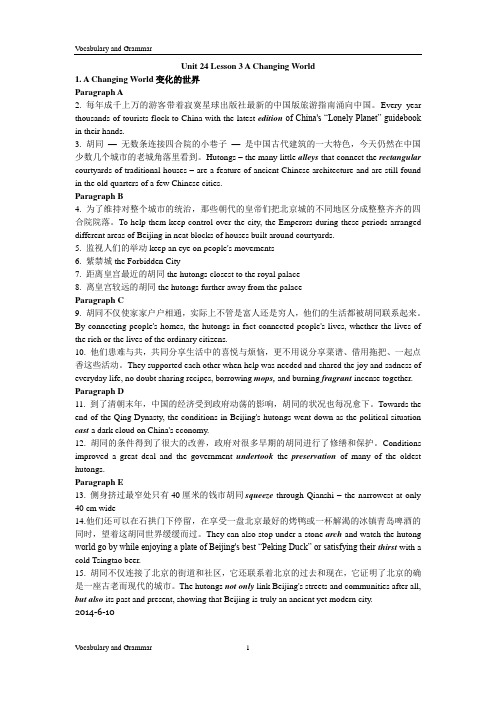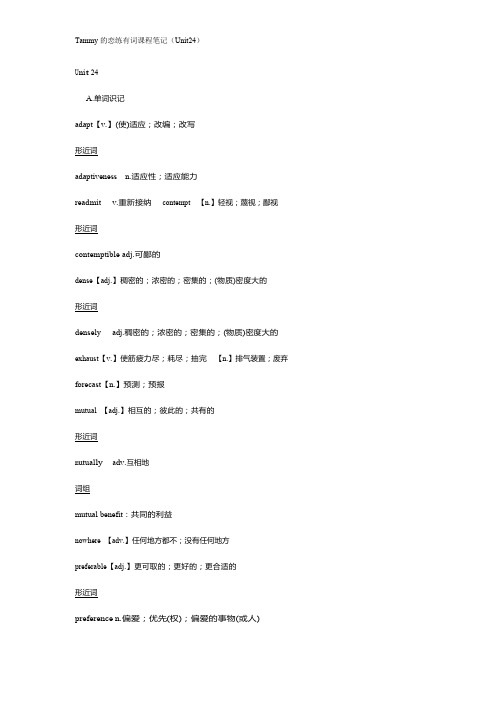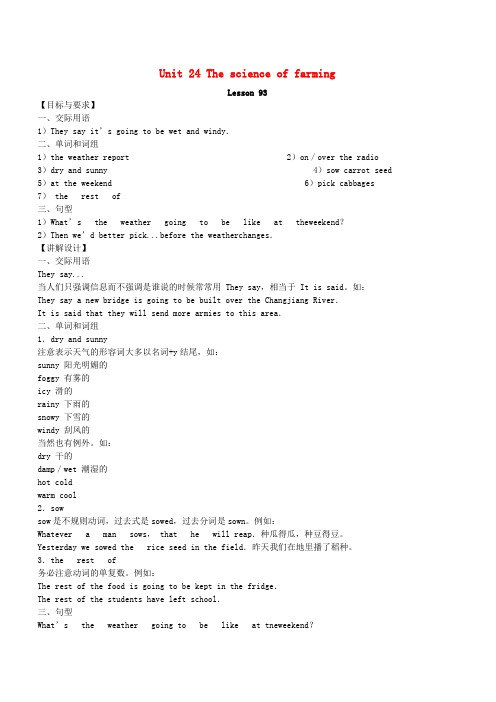unit24
Unit24Alightdinner(课件)新概念英语青少版1B

1. I want a birthday cake. Do you want a birthday cake ?
2. we like fruit.
Do you want fruit?
like和want句型变一般疑问句 一般疑问句: Do+主语+like/want ...? 变化规则: 一加 在句首加Do
What kind of camera has she got?
Practice
1. I have got a Swiss watch. 2. I have got a Japanese camera. 3. She has got a British clock. 4. He has got a German mobile. 5.Lucy has got a French car.
have some fruit for dessert.
Paul: This is great, Karen! A really healthy meal! But I'm very hungry! Karen: Don't worry, Paul! I've got lots of potatoes in the kitchen!
Karen: And you can have some cream with your
strawberries. Just pick them first!
Presentation
Do exercise
8.We want coffee. 9.They like music. 10.I want some peaches. 11.My parents like handbag. 12.Lucy and Candy want some rice. 13.They like watch. 14.They want ten pens. 15.I want a cup of orange juice.
unit 24 finding a job

Unit 24 Finding a job一. 课文理解【单元预习】Lesson 93:课文内容正误判断(True or false)( )1. There are about forty thousand different types of jobs in the world.( )2. The writer thinks choosing the right job is not a difficult job in itself.( )3. ―finding a job‖ means the same thing as ―choosing a job‖.( )4. ―chance ― may play a more important part than ―decision‖.( )5. There is a difference between an interest and a skill.( ) 6. According to the text, if you are interested in art, you must have great ability in art.( ) 7. The best job is one which uses your skill in doing something.( )8. ― I enjoy working with people ― is not a skill with people.( )9. Trust your own ideas and your own thinking in choosing your job.( )10. If you are interested in banking, you’d better talk with a bank manager of over sixty, which will be benefit to you.答案:1T 2 F 3 F 4T 5 T 6 F 7 F 8 T 9 T 10 F【答疑解惑】句子分析1.…Which special qualities make you different from everyone else?有哪些特殊的品质使你与众不同。
Unit 24 Lesson 3 A Changing World 短语句型荟萃

V ocabulary and GrammarUnit 24 Lesson 3 A Changing World1. A Changing World变化的世界Paragraph A2. 每年成千上万的游客带着寂寞星球出版社最新的中国版旅游指南涌向中国。
Every year thousands of tourists flock to China with the latest edition of China's ―Lonely Planet‖ guidebook in their hands.3. 胡同—无数条连接四合院的小巷子—是中国古代建筑的一大特色,今天仍然在中国少数几个城市的老城角落里看到。
Hutongs – the many little alleys that connect the rectangular courtyards of traditional houses – are a feature of ancient Chinese architecture and are still found in the old quarters of a few Chinese cities.Paragraph B4. 为了维持对整个城市的统治,那些朝代的皇帝们把北京城的不同地区分成整整齐齐的四合院院落。
To help them keep control over the city, the Emperors during these periods arranged different areas of Beijing in neat blocks of houses built around courtyards.5. 监视人们的举动keep an eye on people's movements6. 紫禁城the Forbidden City7. 距离皇宫最近的胡同the hutongs closest to the royal palace8. 离皇宫较远的胡同the hutongs further away from the palaceParagraph C9. 胡同不仅使家家户户相通,实际上不管是富人还是穷人,他们的生活都被胡同联系起来。
恋词 考研英语 笔记整理 Unit 24

Tammy 的恋练有词课程笔记(Unit24) 35 percent in 2000 and is expected to approach 38percent by 2005.
reinforce [v]加强 2009 年阅读新题型 Durkheim proposed that religious beliefs functioned to reinforce social solidarity. Durkheim proposed that religious beliefs functioned to reinforce social solidarity.
Tammy 的恋练有词课程笔记(Unit24)
nowhere [adv]任何地方 2009 年阅读 Text 4 According to the standard history of American philosophy,nowhere else in colonial America was“so much important attached to intellectual pursuits.” According to the standard history of American philosophy,nowhere else in colonial America was“so much important attached to intellectual pursuits.”
Tammy 的恋练有词课程笔记(Unit24) 形近词 miss v.错过(机会);漏掉;忽略 commission n.委员会;佣金;犯(罪);委任;委任状 v.委任;使服役;委托制作 emissions-free:零排放 admission n.承认;入场费;准许进入;坦白 commissioner n.理事;委员;行政长官;总裁
unit24Findingajoblanguagepoints

unit24FindingajoblanguagepointsUnit 24 Finding a Job一、教法建议抛砖引玉单元双基学习目标Ⅰ.词汇学习ability,application,female,humannatrue,inform,relationship.suit...to,bored,open up,receptionist,conceitedⅡ.交际英语Making appointments(约会)1.Are you free on Monday?/Will you be free on Saturday night?2.How about tomorrow morning?3.Shall we meet at 4:30 at the bus stop?4.All right. See you then.5.Yes, I'll be free then./Yes,that's all right.6.No, I won't be free then, but I'll be free at 10 o'clock.7.There's something I'd like to talk over with you, I wonder if...8.Would...be convenient for you?/What time would be convenient for you?9.Any time Thursday or Friday is all right./Any time except Thursday or Friday would be all right.10.I'm sorry,but Sunday won’t be so convenient for me./I wonder if we could change the time of... to....You see,something unexpected has come up.交际示范:A:Mr Zhang,there's something I'd like to talk over withyou.Would sometime this week be convenient for you?B:Let me see.Would Wednesday morning be all right?A:That'll fine.Suppose I come to your office at about ten.Or would you prefer some other time?B:No,ten is all right.Ⅲ.语法学习复习状语从句的用法。
译林版牛津五年级英语上册教案Unit24

译林版牛津五年级英语上册教案Unit24一、教学内容本节课选自译林版牛津五年级英语上册,Unit 24《Christmas》。
教学内容包括:Story time,Grammar time和Fun time三个部分。
Story time讲述了主人公们为圣诞节做准备,相互赠送礼物,共度欢乐时光的故事;Grammar time主要讲解一般过去时态的用法;Fun time通过趣味活动,巩固一般过去时态。
二、教学目标1. 能够理解并运用Story time中的词汇和句型,讲述圣诞节的庆祝活动。
2. 掌握Grammar time中的一般过去时态,能够运用该时态描述过去发生的事情。
3. 提高学生的听说读写能力,培养合作意识和创新能力。
三、教学难点与重点重点:Story time中的词汇和句型,Grammar time中的一般过去时态。
难点:一般过去时态的运用,口语表达能力的提高。
四、教具与学具准备1. 教具:PPT、录音机、卡片、挂图等。
2. 学具:英语课本、练习本、彩笔等。
五、教学过程1. 环境创设:播放圣诞歌曲,让学生感受节日气氛,引入课题。
2. 新课导入:通过展示圣诞树、礼物等图片,引导学生复习相关词汇,为新课学习做好铺垫。
3. Story time学习:a. 学生自主阅读,理解故事大意。
b. 教师讲解生词和句型,引导学生模仿跟读。
c. 分角色朗读,提高口语表达能力。
d. 学生根据故事内容,进行角色扮演。
4. Grammar time学习:a. 教师讲解一般过去时态的用法。
b. 学生通过例句,掌握一般过去时态。
c. 学生运用一般过去时态,描述过去发生的事情。
5. Fun time活动:a. 学生两人一组,进行“猜猜看”游戏,巩固一般过去时态。
b. 学生自由发挥,创编关于圣诞节的对话,进行展示。
六、板书设计1. Story time部分:主要词汇和句型,故事情节概括。
2. Grammar time部分:一般过去时态的结构和用法。
Unit 24 The science of farming(二) 教案

Unit 24 The science of farmingLesson 93【目标与要求】一、交际用语1)They say it’s going to be wet and windy.二、单词和词组1)the weather report 2)on/over the radio 3)dry and sunny 4)sow carrot seed 5)at the weekend 6)pick cabbages7) the rest of三、句型1)What’s the weather going to be like at theweekend?2)Then we’d better pick...before the weatherchanges.【讲解设计】一、交际用语They say...当人们只强调信息而不强调是谁说的时候常常用 They say,相当于 It is said。
如:They say a new bridge is going to be built over the Changjiang River.It is said that they will send more armies to this area.二、单词和词组1.dry and sunny注意表示天气的形容词大多以名词+y结尾,如:sunny 阳光明媚的foggy 有雾的icy 滑的rainy 下雨的snowy 下雪的windy 刮风的当然也有例外。
如:dry 干的damp/wet 潮湿的hot coldwarm cool2.sowsow是不规则动词,过去式是sowed,过去分词是sown。
例如:Whatever a man sows, that he will reap.种瓜得瓜,种豆得豆。
Yesterday we sowed the rice seed in the field.昨天我们在地里播了稻种。
Unit 24 A quiz 知识点(讲义)新概念英语青少版2B

Unit 24 A quiz 小测试一、重点单词及拓展:1.带out的部分动词短语:come out 出版;出现find out 找出,查明give out 分发go out 外出;熄灭look out 留神,注意look out of 从……朝外看take out 取出try out 试验,尝试2.带up的部分动词短语:cheer up 振作起来get up 起床give up放弃grow up 成长,成熟look up向上看;查阅make up 组成;化妆pick up 捡起;接某人put up 举起;张贴set up 成立;建立stand up起立take up 占据turn up 调高warm up热身注意:这些动词短语后接名词时,名词放中间或后面都可以;代词一定放中间,如:try it out look them up造句练习:1)警察找到这场事故的原因了吗?2)梦想是伟大的,不要轻易放弃它。
3)当你外出时,记得把门窗关好。
4)那是谁的铅笔?请把它捡起来。
5)这张桌子占据了房间三分之一的空间。
(space)3.表示江河湖海等概念的名词:river 江;河stream 小溪lake 湖sea 海ocean 洋4.七大洲四大洋的英语表达亚洲--Asia 非洲-- Africa 欧洲--Europe 北美洲--North America南美洲--South America 大洋洲--Oceania 南极洲--Antarctica太平洋--the Pacific 大西洋--the Atlantic印度洋--the Indian Ocean 北冰洋--the Arctic Ocean一、语法--形容词的比较级和最高级(一)1.形容词的同级比较:as + 形容词原形+ as 和......一样......否定结构为:not so/as + 形容词原形+ as 不和......一样......例:I was as happy as John yesterday. 昨天我和约翰一样高兴。
- 1、下载文档前请自行甄别文档内容的完整性,平台不提供额外的编辑、内容补充、找答案等附加服务。
- 2、"仅部分预览"的文档,不可在线预览部分如存在完整性等问题,可反馈申请退款(可完整预览的文档不适用该条件!)。
- 3、如文档侵犯您的权益,请联系客服反馈,我们会尽快为您处理(人工客服工作时间:9:00-18:30)。
Unit 4TextIn big cities like New York, you can find homeless women with shopping bags wandering on the streets. They choose to live in an isolated, mistrustful world of their own. They are called lady hermits or just shopping-bag ladies.Lady Hermits Who Are Down But Not OutEvery large city has its shifting population of vagrants. But in most cases these are men, usually with an unhealthy appetite for alcohol. Only New York, it seems, attracts this peculiar populace of lone and homeless women who live in an isolated, mistrustful world of their own.Shopping-bag ladies do not drink. They do not huddle together for warmth and companionship like bums. They do not seem to like one another very much. Neither are they too keen on conventional people. Urban hermits, one sociologist has called them. They will send their days and nights in the same neighborhood for months on end, then disappear as inexplicably as they came. They know the hours when restaurants put their leftovers in the garbage cans where they search for food. And local residents, seeing the same bag lady on the same corner every day, will slip her some change as they pass.Shopping-bag ladies do not overtly beg, but they do not refuse what is offered. Once a shopping-bag lady becomes a figure of your neighborhood, it is as hard to pass her by without giving her some money as it is to ignore the collection box in church. And although you may not like it, if she chooses your doorway as her place to sleep in the night, it is as morally hard to turn her away as it is a lost dog.There are various categories of bag ladies: those who live on the streets, claiming they enjoy the freedom from constraints of society; those who became homeless because a relative died or because they couldn't keep up rent payments, and they didn't know where to go or how to apply for relief; and quasi bag ladies who have an anchor point —— a sister or brother whom they can visit once in a while to take a bath.Most shopping-bag ladies seem to be between the ages of 40 and 65. They wear layers of clothes even in summer time, with newspapers stuffed between the layers as further protection against bad weather In general, the more bags the ladies carry the better organist bad weather. In general, the more bags the ladies carry the better organised they are to cope with life on the streets."You may think I have a lot of garbage in these bags," one shopping-bag lady volunteered over lunch in a church soup kitchen, "but it's everything I need. Extra clothes, newspapers for the cold." Shopping-bag ladies are not very communicative and take general conversation as an intrusion. But after a while, warmed by chicken soup, she began to speak."The place is nice," she volunteered, "people are friendly. Most New Yorkers are very cold. I have sisters in the city, but when you grow up, each goes his own way. Right?""I go out a lot because of my teeth. You know how it is: you pick up something in a restaurant and your teeth turn rotten, no matter how careful you are. People aren't considerate. The restaurants don't wash the glasses properly, and before you know where you are you have caught it. That's what happened to me. I don't like meeting people until I have this dental work done. So I go out to forget my troubles. I sit a little while somewhere, have something to eat at one of these places, then go wherever I have to go. I take all my things with me because you can't trust people."The story of the dental work was a typical shopping-bag lady fantasy. Psychiatrists say that even after long interviews shopping-bag ladies are still at a loss to separate truth from imagination.One quasi bag lady spends about eight hours every day at the foot of the main escalator in a railroad station, although she rents a room in a cheap hotel in the neighborhood. One of the priests from the nearby church found this lodging for her after he discovered that she was entitled to a small disability pension which she had never claimed. But every day from about nine to five, she still takes a milk crate and sits by the station escalator, not doing anything or talking to anyone. It's like a job to her.No one knows how many shopping-bag ladies there are in New York. The figure is going up. Some priests, nuns and researchers spend a great deal of time shepherding or observing shopping-bag ladies and are doing what they can to better the life of the lady hermits who are down.NEW WRODShermitn. person who avoids other people and lives alone 隐士shiftvi. move from one place, position, etc. to another 转移,移动vagrantn. person who lives a wandering life with no steady home or work 流浪者appetiten. desire or wish, esp. for food 食欲,胃口attractvt. draw towards oneself 吸引attraction n.attractive a.peculiara. unusual; strange 奇特的;奇怪的populacen. population; the common peoplelonea. without other people or things 孤独的isolatevt. separate from others 使隔离,使孤立mistrustfula. lacking confidence or trustshopping-bagn. 购物袋huddlevi. crowd together 挤作一团warmthn. the state or quality of being warmcompanionshipn. 伴侣关系,友谊;一群伙伴companion n.bumn. wandering beggar 游民,叫化子keena. eager, anxious to do things 热心的,渴望的conventionala. following accepted practices, customs, and standards 习俗的,寻常的conventionv. 习俗,惯例sociologistn. a person who studies societies and human behavior in groups 社会学家neighborhoodn. a group of people and their homes forming a small area within a larger place 街坊,四邻inexplicablyad. in a way not capable of explanationleftoversn. (used with a pl, v.) food remaining uneaten after a mealgarbagen. waste material; rubbish; scraps of food to be thrown awaygarbage candustbin 垃圾桶residentn. person living in a place permanently, not just a visitor 居民slipvt. give or pay secretly 悄悄给overtlyad. publicly 公开地collectionn. the gathering of money at a religious service; money collected 募捐;募金collection boxa box for the collection of money, esp. one passed from hand to hand in church 奉献箱doorwayn. 门口;门道morallyad. with regard to right behavior 道德上categoryn. class 种类claimvt. declare to be true; ask for as a right; take as a rightful owner 声称;要求;认领constraintn. sth. that limits one's freedom of action 拘束rentn. money paid regularly for the use of a room, building, or piece of land 租金vt. pay at regular times for the use of (property)租用paymentn. the amount of money (to be) paidreliefn. help given to people in trouble 救济quasia. half; seeming 半,准anchorn. 锚;依靠layern. 层stuffvt. fill tightly with 把……塞满protectionn. the act of protecting or the state of being protectedprotective a.copevi. deal successfully with a difficult situation 对付,应付volunteervt. tell or say without being asked; make a willing offer 主动讲;自愿提供voluntary a.soupn. 汤communicativea. ready and willing to talk or give information 愿意交谈的communicationn. 交流;通讯conversationn. (an) informal talk 谈话intrusionn. coming unasked and unwanted (often suggesting rudeness and invasion of privacy)侵犯;打扰rottena. having gone bad 腐烂的;腐朽的consideratea. thoughtful of the rights or feelings of others 体谅的dentala. of or for the teethwhereverconj. in, at, or to whatever placefantasyn. any strange mental image or illusion; wild imagination 怪念头;幻想psychiatristn. doctor who treats mental and emotional disorders 精神病医生lossn. the act or example of losing sth.escalatorn. 自动楼梯priestn. 牧师;教士;神父lodgingn. a (temporary) place to live (临时)住所(使)暂住,(使)寄宿entitlevt. give the right to 给……以权利disabilityn. the condition of being unable to perform a task or function because of a physical or mental impairment 伤残pensionn. regular payment made (by a government or a company) to sb. old, retired, or disabled 养老金;退休金;抚恤金craten. a plastic or wooden tray divided into sections for carrying bottles of milk, beer, etc. 篮,篓,箱nunn. 修女;尼姑shepherdvt. take care of guide or direct (people) like sheep 看护;带领bettervt. improvePHRASES & EXPRESSIONSkeen oninterested in, fond ofon endcontinuously 连续地pass bygo past; pay no attention to 从……旁走过;忽视turn awayrefuse to allow (sb.) to enter 将……拒之门外keep upmaintain; continueonce in a wholesometimes; but not often 间或,偶尔in generalin most cases; usually 通常cope withdeal effectively with 善于处理not matter how/what, etc.however, whatever, etc.at a lossuncertain what to do or say; confused 不知所措;因惑be entitled tohave the right to。
